Eurovision 2014: The evolution of Eurovision
- Published
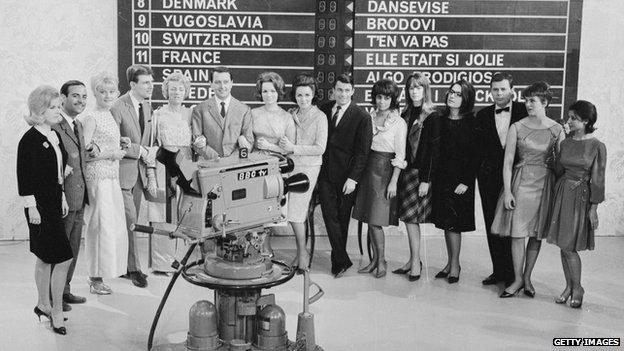
The Eurovision Song Contest was held at BBC's Television Centre in London in 1963
The finalists for the 59th annual Eurovision Song Contest are now decided and ready to perform in Copenhagen, Denmark, on Saturday.
British hopeful Molly Smitten-Downes will be among the 26 acts hoping to emulate previous winners such as Abba, Bucks Fizz and Celine Dion when she takes to the stage for the world's biggest music contest.
From humble beginnings, things have moved on considerably since it began in Switzerland in 1956 - from spiralling costs to the influence of The X Factor. Here we look at the evolution of Eurovision.
The United Kingdom's success rate
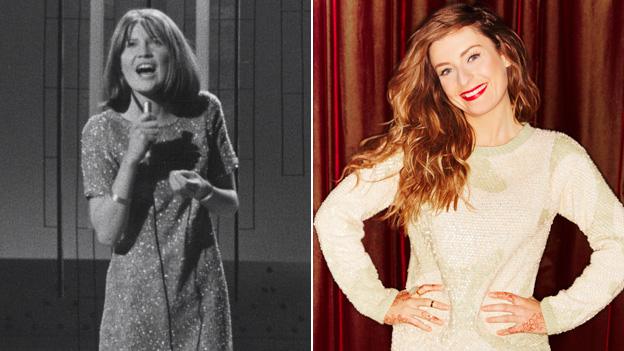
Sandie Shaw was the UK's first Eurovision winner in 1967, Smitten-Downes is hoping to be the sixth
It is easy to forget when faced with the scores for Engelbert Humperdinck (25th out of 26 in 2012), Bonnie Tyler (19th out of 26 in 2013) or Jemini (nil points and last place in 2003), that the United Kingdom has not always been a Eurovision failure.
The UK is actually the joint second most successful country - sharing the honour of having won five times with Luxembourg, France and Sweden.
Only Ireland has been more successful, clinching Eurovision victory a whopping seven times.
Sandie Shaw's Puppet On A String became the UK's first winner in 1967, before Lulu's Boom Bang a Bang tied with Spain, the Netherlands and France in 1969. In 1976, it was the turn of Brotherhood of Man, Bucks Fizz triumphed in 1981 and Katrina and the Waves took the crown in 1997.
Great Britain has recently spent more time on the bottom half of the leader board, but this year's entry Smitten-Downes is hoping to turn things around - and Radio 1 DJ and Eurovision presenter Scott Mills thinks she has a chance.
"We've tried to get former pop stars that have a following in Europe and it didn't translate in terms of votes, but actually I think getting a newcomer with an amazing voice - I mean she can really sing - is probably the way forward."
Mills added: "I know they've really studied the science of it as well this year, gone into the details of what kind of person wins, what age they are, the structures of the songs.
"So if we don't do even slightly better this year I'd be really surprised."
Norway is the least successful Eurovision country of all time - having finished last 11 times and scoring 'nil points' on four separate occasions.
The campaigning
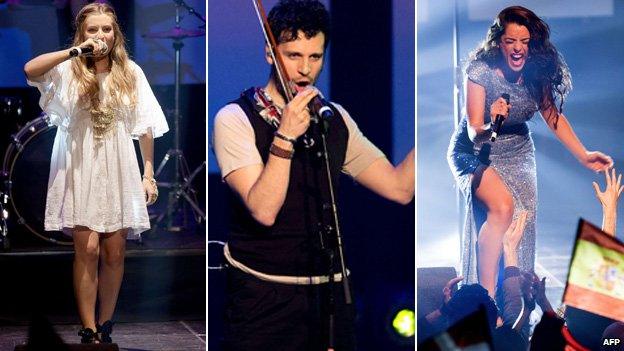
The UK, Switzerland and Spain were among the acts performing at Eurovision in Concert in Amsterdam last month
There was a time when each country's entry was only heard once by Eurovision voters - on the night they performed it in the competition.
Thanks to social media and increasingly large promotional campaigns, those days are long gone. This year Radio 2 is even running a pop-up digital radio station, so fans can really get to know the entries ahead of voting.
The last time the UK pulled in a respectable score - when Jade Ewan came fifth in Moscow in 2009 with a song by Andrew Lloyd Webber - the pair had been on a press tour of Europe to drum up support.
This year, Smitten-Downes was one of several contestants to perform at a live show in Amsterdam last month and told the BBC she thinks campaigning makes a difference.
"I think it is quite important, it definitely gives you an advantage if people are hearing your song beforehand," she said.
"Us humans, we like familiarity. We know that if you hear something so many times, you remember it, you like it."
She added: "But I like to think it will be the best song that wins and not because of campaigns and politics or anything like that."
The fan community also plays a big part in stirring up support for songs, with more than 83,000 of them signed up to the Eurovision Family online site.
The 'X Factorisation' of Eurovision
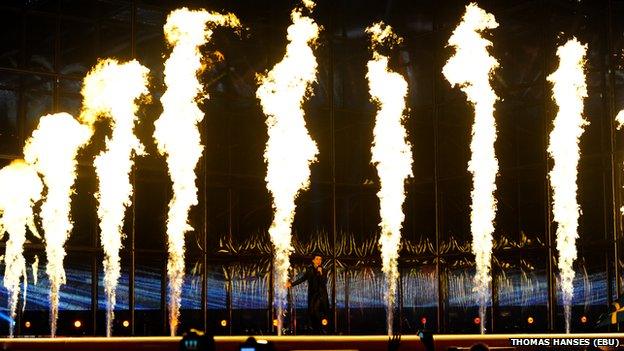
The staging and production of the song contest has become increasingly ambitious
A generation raised on shows such as The X Factor and The Voice are used to hopefuls warbling into their living room on a Saturday night - and those programmes have had a big influence on Eurovision.
"The show that they put on now is pretty spectacular," said Mills, who hosted the semi-finals for BBC Three.
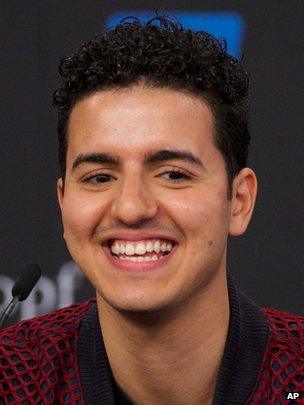
Basim came fourth in the Danish version of The X Factor when he was just 15
"For the last two years a German company who do all the stuff for X Factor in Germany have built the stage and it looks impressive."
The contest now regularly features former talent show contenders - with Ireland picking X Factor rejects Jedward to represent them not once but twice, in 2011 and 2012.
This year's entries include Denmark's Basim, who came fourth in the first season of the Danish X Factor, and the Ukraine's Mariya Yaremchuk who reached fourth place in their version of The Voice in 2012.
Acts from Sweden, Albania, Hungary, Austria, Israel, Italy and Lithuania are also all veterans of televised talent contests on their home turf.
"I think that is why the standard is better," said Mills.
"They know how to look at the camera, they know how to perform to that large audience - because it's actually a really daunting thing to perform for 170 million people."
Spain's entry Ruth Lorenzo came fifth in the UK X Factor in 2008.
"What can I say? X Factor is the best show in the world," Lorenzo told the BBC.
"And it prepares you for anything. If you've survived X Factor, Eurovision is nothing."
The voting
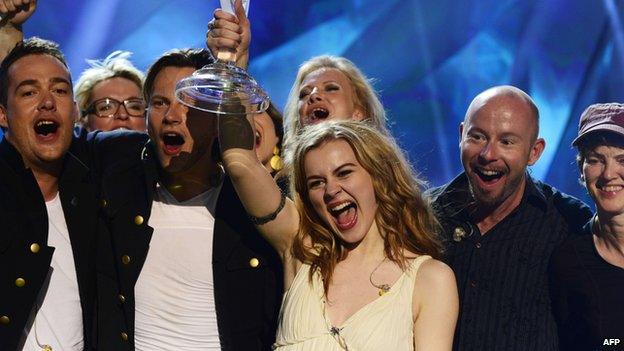
Denmark's Emmelie de Forest clinched victory in Sweden last year
For years, Eurovision has been dogged by rumours of vote-rigging, bribery and countries doing deals to support their neighbours.
This year organisers are getting tough in a bid to "strengthen the credibility of the voting and protect the Eurovision Song Contest brand" - with any countries caught in the act facing a ban of up to three years.
New rules also mean each country's jury has been revealed ahead of the contest, instead of after the final and their votes will be published.
They account for 50% of the total score along with the televoting by the public - over the phone, on the Eurovision app or by text.
There is more information about how the complicated voting system works available at the official website., external
The changes follow last year's investigation into voting for Azerbaijan - when rigging attempts were detected by the European Broadcasting Union's (EBU) security systems.
Executor Jon Ola Sand said: "In nearly every competition, there are attempts to cheat. It's our job to spot and stop these attempts."
How much it all costs
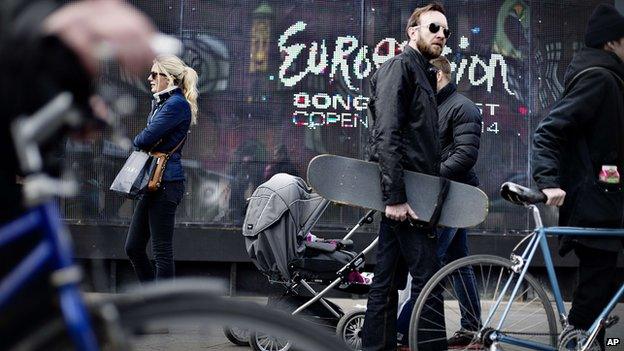
This year's Eurovision takes place in Copenhagen, Denmark
Denmark has already bust its budget for this year, after renovating a former shipyard to create the venue, and press reports this week, external claimed the national broadcaster has had to cough up an additional 22.8m kroner (3m euros / £2.5m) after organisers ran out of funds.
Hosting Eurovision is definitely not cheap and, until last year's cost-cutting exercise in Malmo, budgets had spiralled out of control.
Norway's broadcaster NRK had to give up the rights to the World Cup when they hosted the show in 2010, spending around 211m kroner (£23m) and Azerbaijan was rumoured to have spent the equivalent of 60m euros (£49m) when it hosted in 2012.
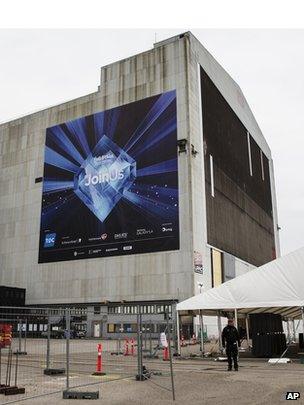
The venue B&W Hallerne is a renovated shipyard in Copenhagen
"Malmo did it for 12m euros (£9.8m) last year," said Ewan Spence, who writes for ESC Insight , external and Forbes.
"Swedish broadcaster SVT committed very little capital to the contest thanks to smart budgeting, using revenue from tickets sales and so on.
"Whereas Azerbaijan and Russia (2009) threw loads of money into it because it was an opportunity to showcase themselves on the world stage," added Spence.
And what an showcase it it is: Denmark's tourism agencies estimated the country earned 117m kroner (£12.9m) after Copenhagen last played host in 2000.
As well as boosting the local economy during the competition, Visit Denmark says a TV audience of 125 million viewers could translate into advertising revenue alone of 160m kroner (£17.6m) this time round.
The last few years have seen countries including Portugal, Serbia and Croatia stay away - mainly due to the cost of sending a delegation.
A freedom of information request revealed the BBC spent around £300,000 taking Humperdinck to Azerbaijan, fuelling criticism of the use of the BBC licence fee, particularly when the UK performed badly.
However, the EBU is keen to point out the Eurovision Song Contest is actually "cost-effective" broadcasting and Spence agrees.
"If you compare that with Strictly, which is believed to cost about £1m an hour, the value of Eurovision is seven hours of prime time TV for roughly the same cost, excellent value for the licence fee payer," said Spence.
Join Graham Norton for the grand final on BBC One this Saturday 10 May from 20:00 BST.